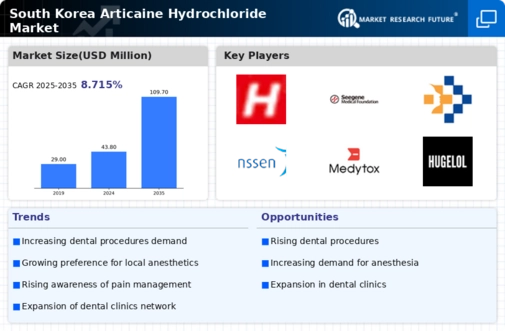Growing Dental Health Awareness
The increasing awareness regarding dental health in South Korea is a significant driver for the articaine hydrochloride market. As the population becomes more informed about the importance of oral hygiene and regular dental check-ups, the demand for dental procedures is likely to rise. This trend is supported by various health campaigns and educational programs that emphasize preventive care. Consequently, The articaine hydrochloride market will experience growth as dental practitioners seek effective anesthetic options to enhance patient comfort during procedures. The market's expansion could be further evidenced by a projected increase in dental visits, with estimates suggesting a rise of approximately 15% in the next few years. This heightened focus on dental health is expected to bolster the demand for articaine hydrochloride, positioning it as a preferred choice among dental professionals.
Rising Number of Dental Clinics
The proliferation of dental clinics across South Korea is a significant factor influencing the articaine hydrochloride market. With an increasing number of dental practices opening, there is a corresponding rise in the demand for anesthetic agents to facilitate various dental procedures. This trend is indicative of a broader shift towards accessible dental care, which is likely to enhance the utilization of articaine hydrochloride. Market data suggests that the number of dental clinics has increased by approximately 20% over the past five years, reflecting a growing emphasis on oral health services. As more clinics emerge, the competition among dental practitioners may drive the adoption of effective anesthetics, further propelling the articaine hydrochloride market. This expansion could lead to a more diverse range of applications for articaine hydrochloride in various dental procedures.
Increasing Cosmetic Dentistry Trends
The rising popularity of cosmetic dentistry in South Korea is a driving force for the articaine hydrochloride market. As more individuals seek aesthetic dental procedures, the demand for effective anesthetics to ensure patient comfort during these treatments is likely to grow. Cosmetic procedures, such as teeth whitening, veneers, and orthodontics, often require anesthesia to manage discomfort, thereby increasing the utilization of articaine hydrochloride. Market analysis indicates that the cosmetic dentistry sector has expanded significantly, with a projected growth rate of around 12% annually. This trend suggests that dental practitioners will increasingly rely on articaine hydrochloride to provide a pain-free experience for patients undergoing cosmetic enhancements. Consequently, the articaine hydrochloride market may experience a notable uptick in demand as cosmetic dentistry continues to gain traction.
Regulatory Support for Dental Anesthetics
Regulatory frameworks in South Korea are increasingly supportive of the use of anesthetics in dental practices, which may positively impact the articaine hydrochloride market. The government has implemented guidelines that facilitate the safe and effective use of dental anesthetics, ensuring that practitioners have access to high-quality products. This regulatory environment is likely to encourage dental professionals to adopt articaine hydrochloride as a preferred anesthetic option, given its favorable safety profile and efficacy. Additionally, the market may benefit from ongoing research and development initiatives aimed at enhancing the formulation and delivery of anesthetics. As regulatory bodies continue to endorse the use of effective anesthetics, the articaine hydrochloride market could see a potential increase in demand, contributing to its overall growth trajectory in the coming years.
Technological Innovations in Dental Practices
Technological advancements in dental practices are likely to play a crucial role in shaping the articaine hydrochloride market. Innovations such as digital imaging, laser dentistry, and computer-assisted anesthesia systems are enhancing the efficiency and effectiveness of dental procedures. These technologies not only improve patient outcomes but also increase the demand for reliable anesthetics like articaine hydrochloride. As dental clinics in South Korea adopt these modern technologies, the need for high-quality anesthetics that provide rapid onset and effective pain control becomes paramount. The articaine hydrochloride market may benefit from this trend, as practitioners seek to integrate advanced techniques with effective anesthetic solutions. Furthermore, the market could see a potential growth rate of around 10% annually, driven by the increasing adoption of these technologies in dental practices.






















Leave a Comment